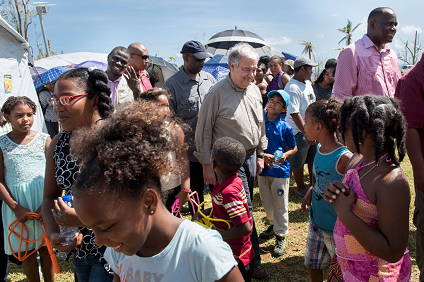
UN Secretary-General António Guterres visiting the Caribbean post Hurricane Maria
By David Singh
Geneva, 9 October 2017 - Visiting hurricane devastated islands in the Caribbean at the weekend, the UN Secretary-General, António Guterres Guterres, stated that “the link between climate change and the devastation we are witnessing is clear, and there is a collective responsibility of the international community to stop this suicidal development.”
“And for that, it is essential that the Paris Agreement on climate change is fully endorsed and respected but also to recognize that the commitments made in Paris are not enough,” he said referring to agreement by UN Member States to reduce greenhouse gas emissions in order to limit global temperature rise to well below 2 degrees Celsius and to strive for 1.5 degrees.
“I have never seen anywhere else in the world a forest completely decimated without one single leaf on any tree,” said UN Secretary-General António Guterres during his visit to the storm-wrecked island of Dominica in the Caribbean yesterday.
Dominica, nicknamed the "Nature Isle of the Caribbean" for its lush mountain forests, took a direct hit from Hurricane Maria, a category 5 storm that made landfall on 18 September and battered the country of some 72,000 people. It left the population without electricity, water, destroyed homes, health clinics, and isolated mountain communities.
In a Facebook post following the catastrophe, Dominica’s Prime Minister, Roosevelt Skerrit, said, "So far we have lost all what money can buy and replace.”
Figures for the homeless are still unavailable, but according to the World Food Programme’s (WFP), Regional Director for Latin America and the Caribbean, Miguel Barreto, there were approximately 30 deaths, while around 80 per cent of the buildings were damaged with many roads blocked or impaired.
Taking stock of the immense damage and relief efforts, the UN Secretary-General paid tribute to Dominican leaders for their vision to not only rebuild, but to become the world's first climate-resilient nation. He stressed that the level of support required by Dominica could not be achieved via traditional instruments. […] “There must be new financial instruments, bonds of different natures, linked mainly to the buildup of resilience. There must be a way to look into the debt of these countries and to transform it into an instrument of reconstruction and resilience.”